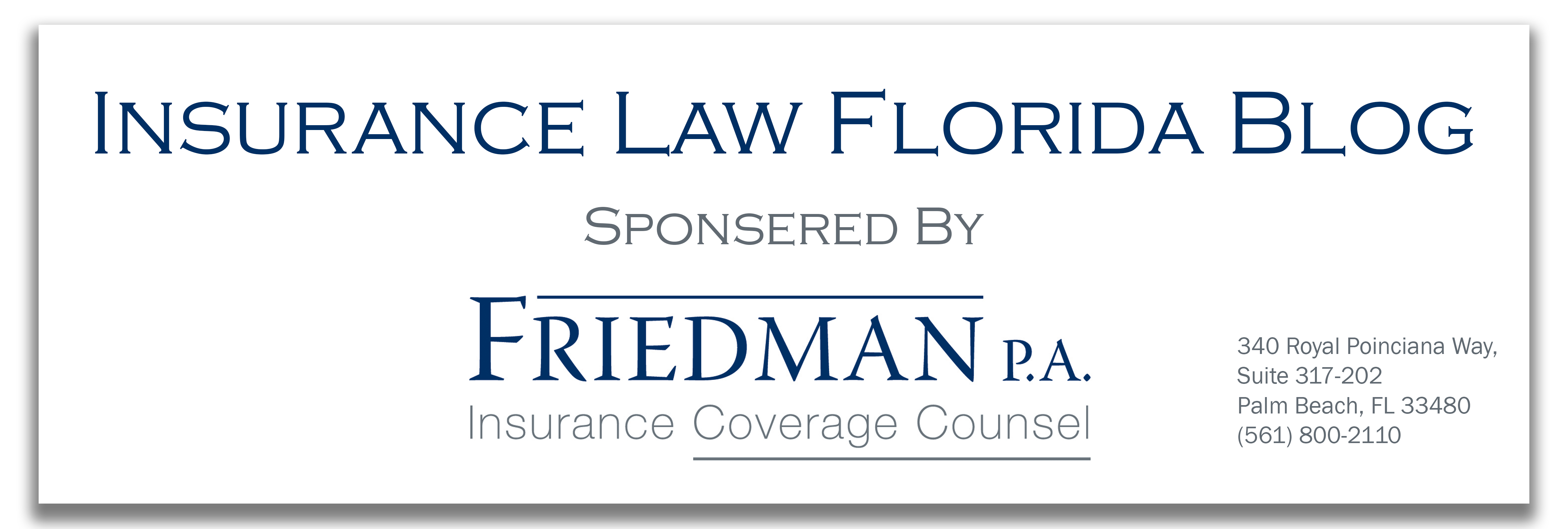Let’s take a short break from the top 10 insurance myths series to discuss a recent Eleventh Circuit decision that might seem a bit puzzling at first. (Hat tip to my friend Dan Thomas, construction lawyer extraordinaire at Leopold Law, for sending me a copy of the opinion.) In Ruderman v. Washington National Insurance Corp., No. 10-14714 (11th Cir. Feb. 17, 2012) (appeal of docket No. 1:08-cv-234011-JIC), the Eleventh Circuit certified to the Florida Supreme Court the question of whether an ambiguous insurance policy provision should be construed against an insurer without examining extrinsic evidence.
At first blush, this seems like a basic precept of Florida coverage law, so why the need to certify? The Eleventh Circuit explained that the rule of contra proferentem (Latin for “against the offeror”) has been settled law in Florida since at least the time the Florida Supreme Court answered another certified question in Auto-Owners Ins. Co. v. Anderson, 756 So. 2d 29 (Fla. 2000). The Anderson Court answered that “[a]mbiguous policy provisions are interpreted liberally in favor of the insured and strictly against the drafter who prepared the policy.” What could be clearer than that?
The Eleventh Circuit also noted that in other Florida cases, including Excelsior Ins. Co. v. Pomona Park Bar & Package Store, 369 So. 2d 938 (Fla. 1979), Florida courts have allowed the use of extrinsic evidence before resolving policy ambiguities. The Eleventh Circuit did not elaborate on this point, but those courts that have allowed extrinsic evidence to resolve policy ambiguities generally do so for latent ambiguities (in which the contract language is rendered ambiguous by some collateral matter) as opposed to patent ambiguities (in which the ambiguity appears on the face on the policy).
It has always struck me as inequitable that courts allow an insurer to introduce extrinsic evidence to explain what it meant by the ambiguous policy language that the insurer wrote. If the language is ambiguous, meaning that the policyholder can proffer a reasonable interpretation (not the only reasonable interpretation or even an interpretation better than that offered by the insurer — just a plausible interpretation), then the inquiry should end.
Policyholders should be able to introduce extrinsic evidence to demonstrate that policy language which appears clear on its face is ambiguous when viewed in a broader light, such as what the insurance industry represented to regulators when seeking approval of their policy form. Some states follow the doctrine of Regulatory Estoppel, which holds the insurance industry to the promises it makes when it seeks approval of new forms. For example, insurers convinced state regulators to allow the use of an “absolute” pollution exclusion by promising that the exclusion would only be applied in situations involving traditional environmental pollution (e.g., CERCLA violations, Superfund sites, toxic waste dumping, etc.). Insurers then turned around and applied the exclusion to everything from household paint fumes to Chinese drywall. Unfortunately, Florida courts have turned a blind eye to the industry’s regulatory misrepresentations, and instead restrict their inquiry to the words on the page.
Florida courts also prohibit the use of the Reasonable Expectations doctrine, followed by many jurisdictions, in which insurance policy provisions are viewed in light of what the insurer represented to the policyholder when marketing the policy, as well as the policyholder’s objectively reasonable belief that the insurance would protect against a particular type of loss. By rejecting both the Regulatory Estoppel and Reasonable Expectations doctrines, Florida courts already make it difficult for policyholders to demonstrate an ambiguity where the policy language in isolation appears clear.
Florida’s policyholders need the Florida Supreme Court to clarify the law in this area, and get lower courts back to basic principles. If a policy provision is ambiguous, the policyholder wins. Period. End of inquiry.
Insurers should not get a second chance to explain what they meant to say when they wrote the insurance contract.
